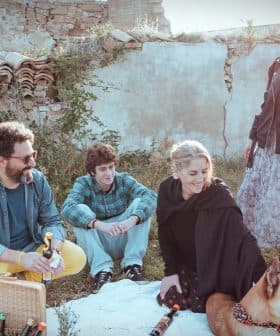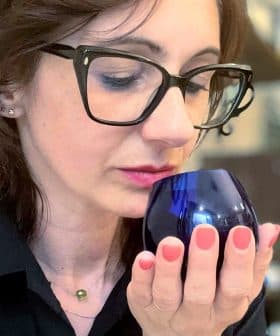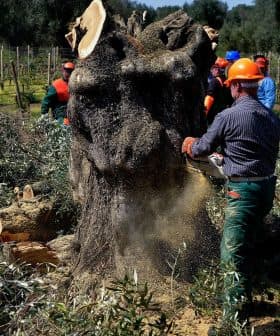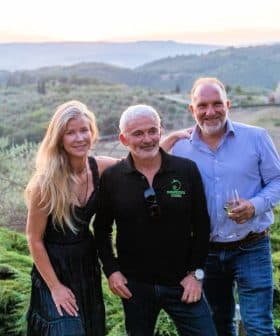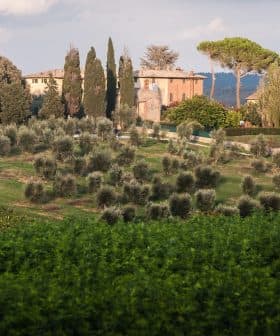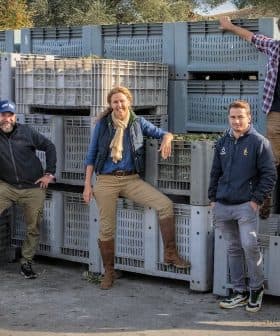Italian Producers Extend Reign of Excellence at World Competition
Uncompromising farmers, millers and bottlers made Italy the most awarded country at the 2025 NYIOOC for the tenth consecutive year.
 Johannes Pan (right) and his family are the producers behind Paneolio Amethyst and Peridot at Ca Crespana farm (Photo: Ca Crespana)
Johannes Pan (right) and his family are the producers behind Paneolio Amethyst and Peridot at Ca Crespana farm (Photo: Ca Crespana) Italy once again dominated the 2025 NYIOOC World Olive Oil Competition, receiving a total of 200 awards, with the Italian producers and millers winning the highest number of awards for the tenth consecutive year. The competition saw a significant participation of producers from various regions of Italy, showcasing their commitment to quality and sustainability in olive oil production.
Italy was once again the most awarded country in the 2025 NYIOOC World Olive Oil Competition, having reached the round figure of 200 total recognitions – 11 shy of the country’s record of 211 accolades set in 2021.
We always face the challenges of agriculture with enthusiasm, to constantly improve.
The Italian producers and millers received the highest number of awards for the tenth year in a row, making their entry in the Official Guide to the World’s Best Olive Oils with a record 163 Gold Awards and 37 Silver Awards.
They also have submitted the highest number of entries, 258, just two short of the record 260 entries set in 2021.
Such significant figures crown a successful decade, during which farmers across the country have consistently proven their quality and demonstrated an ever-growing expertise in crafting outstanding blends and monovarietals.
Overcoming pressing issues, such as the effects of climate change and increased production costs, they have remained true to the value of sustainability, implementing organic and regenerative practices that are now widely adopted among top-tier producers.
See Also:The best extra virgin olive oils from ItalyThe 2025 NYIOOC saw a massive participation of producers from central and southern regions of the country, including Tuscany, Puglia, Sicily, Umbria, Campania and Lazio.
Entries also came from Liguria, Marche and Abruzzo, as well as the island of Sardinia, and the northern regions of Emilia-Romagna, Veneto and Trentino-Alto Adige.
“We had a great harvest, thanks to a good distribution of rainfall throughout the year, not excessively long dry periods and that, in any case, prevented olive fruit fly outbreaks,” said Daniel Ronca of Frantoio Il Mandorlo.
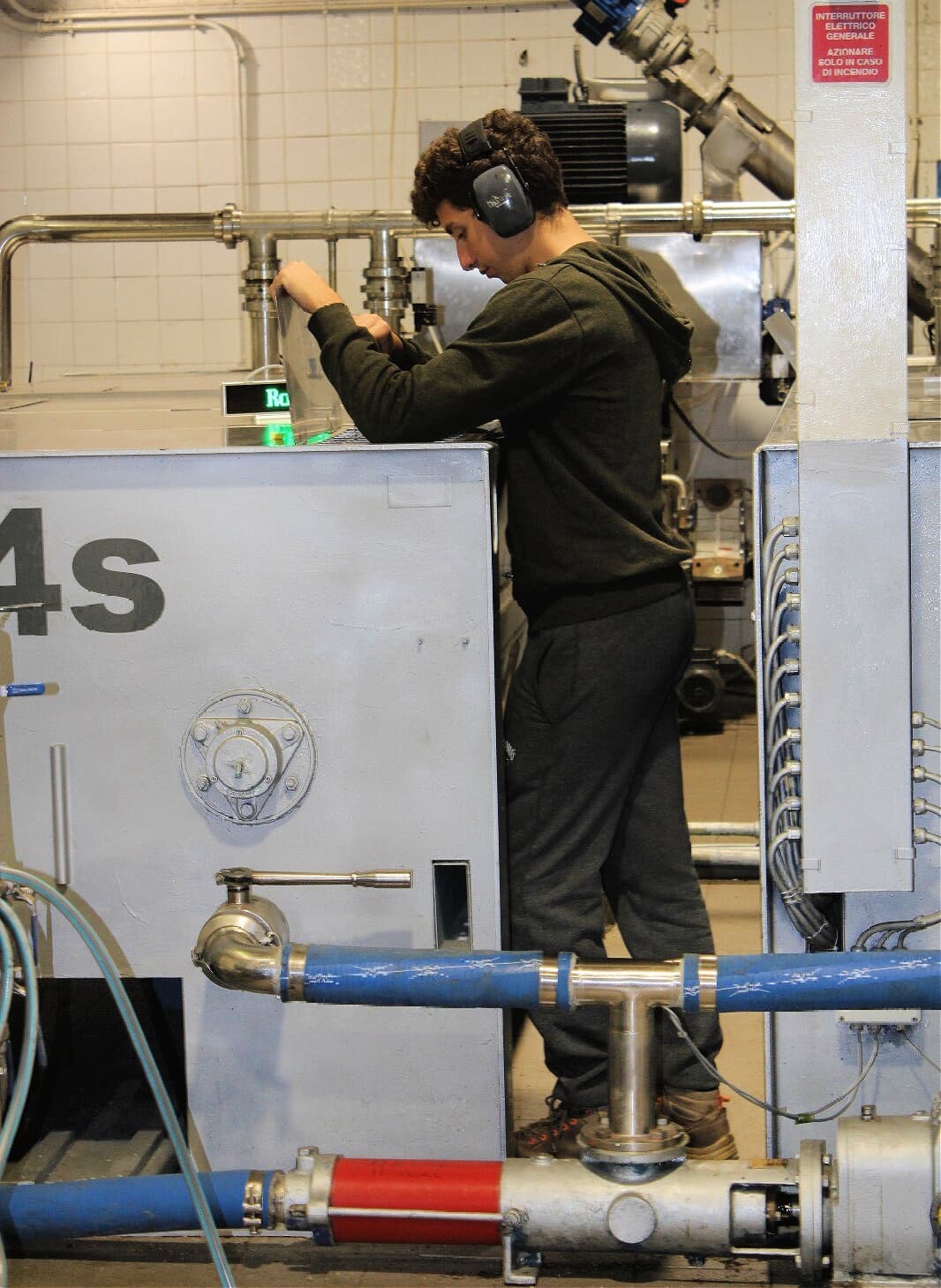
Daniel Ronca of Frantoio Il Mandorlo produces an acclaimed organic blend of Frantoio, Moraiolo, Leccino and Pendolino olives. (Photo: Frantoio Il Mandorlo)
“The flowering was very good both in terms of ‘mignolatura’ (bud growth) and pollination, so let’s say it was an ideal year,” he added.
His family’s company received a Gold Award for Il Mandorlo Bio, an organic blend primarily composed of Frantoio and Moraiolo, with smaller percentages of Leccino and Pendolino.
Scattered over six hectares of organic land, their 2,000 olive trees thrive on the Florentine hills, north of the Tuscan capital, where the company mill was established in 1974. Today, the facility boasts the latest generation technology.
“We also work for third parties, and some of our clients participated and won awards at the NYIOOC,” said Ronca, who has been in charge of the milling operations since 2019.
“This adds to the satisfaction of obtaining our Gold. We decided to participate in the World Competition because it offers prestige and recognition, as well as through tools like the Olive Oil Times World Ranking,” he added. “Since we have customers in the U.S. and worldwide, our participation was aimed precisely at giving them further proof of the quality of our oil.”
In the adjacent town of Pontassieve, the hamlet of Sieci is home to the organic producer La Gramigna, which received a Gold Award for its Olio Grullo, a Maurino monovarietal.
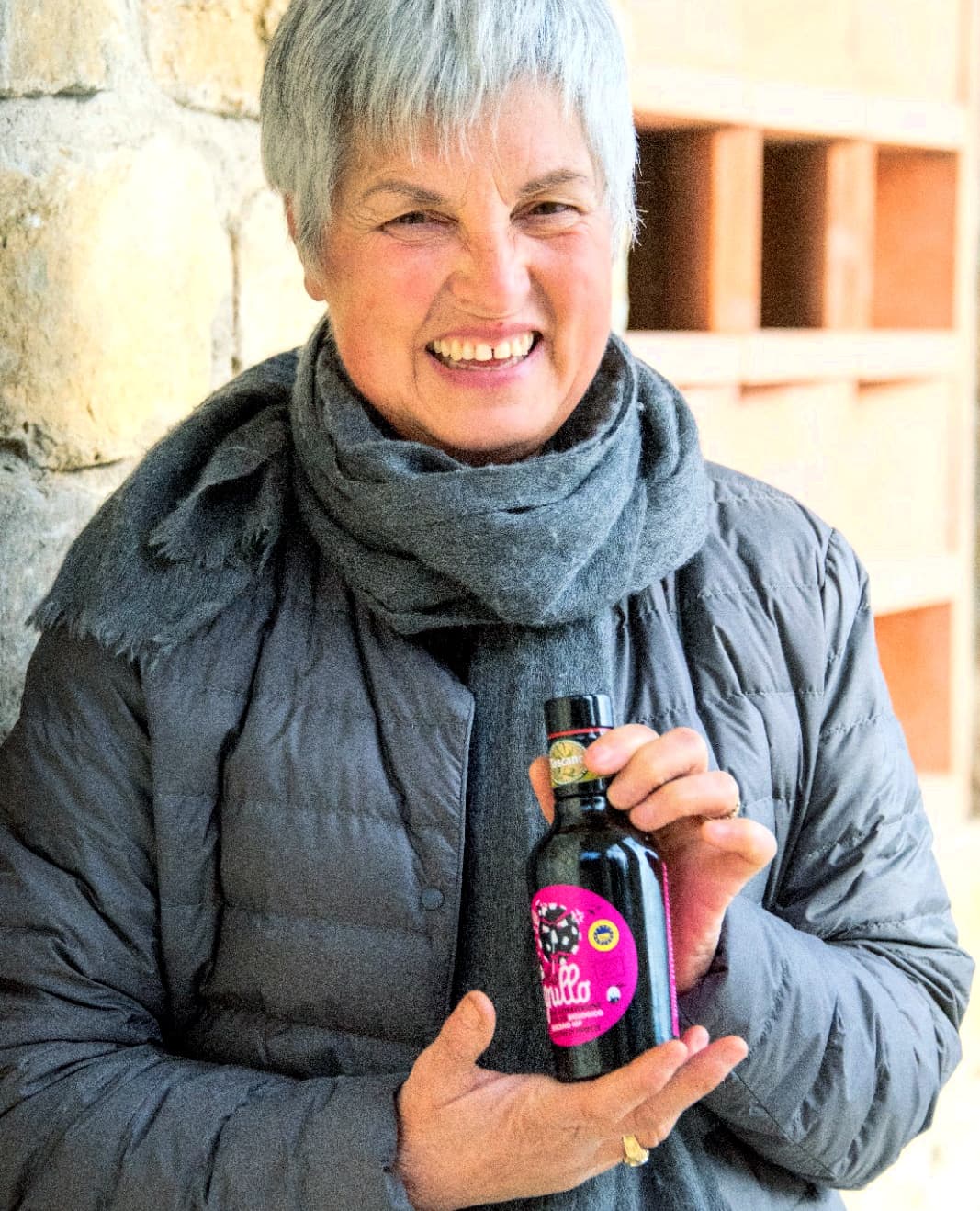
Renata Conti is the producer behind Olio Grullo at La Gramigna farm (Photo: La Gramigna)
This and other native varieties, such as Leccino, Frantoio, Moraiolo and Pendolino, for a total of 6,000 olive trees, many of which are centuries old, are cultivated on the hills east of Florence by Renata Conti and her family.
“This oil is the result of a great harvest, probably the best of the last years, both in terms of quantity and quality, but also of the great care that we put in producing our extra virgin olive oils in our small, state-of-the-art mill,” she emphasized. “The NYIOOC is an important showcase on the international market, and this award pays off our commitment to quality.”
“We have chosen this name for our oil because we like to joke a bit,” Conti pointed out, referring to grullo, a regional word often used affectionately to describe a loopy person. “The label, which my son designed, includes a ‘funny story’ that changes every year.”
Deep corporate values counterbalance light-heartedness in packaging. The company is firmly committed to protecting the environment, maintaining soil health and preserving the landscape.
“Our orchards are sustainably managed, and renewable energy sources power our facilities,” Conti said. “Furthermore, we are engaged in safeguarding the beauty of this landscape, both carrying out recovery interventions of abandoned olive orchards and planting new trees, also aiming at restoring the hydrogeological cycle.”
In northern Lazio’s Tuscia, an excellent harvest earned Pietro Re top honors for Tamia Gold Organic, at its tenth accolade, and Tamia Caninese Organic, at its seventh Gold Award.
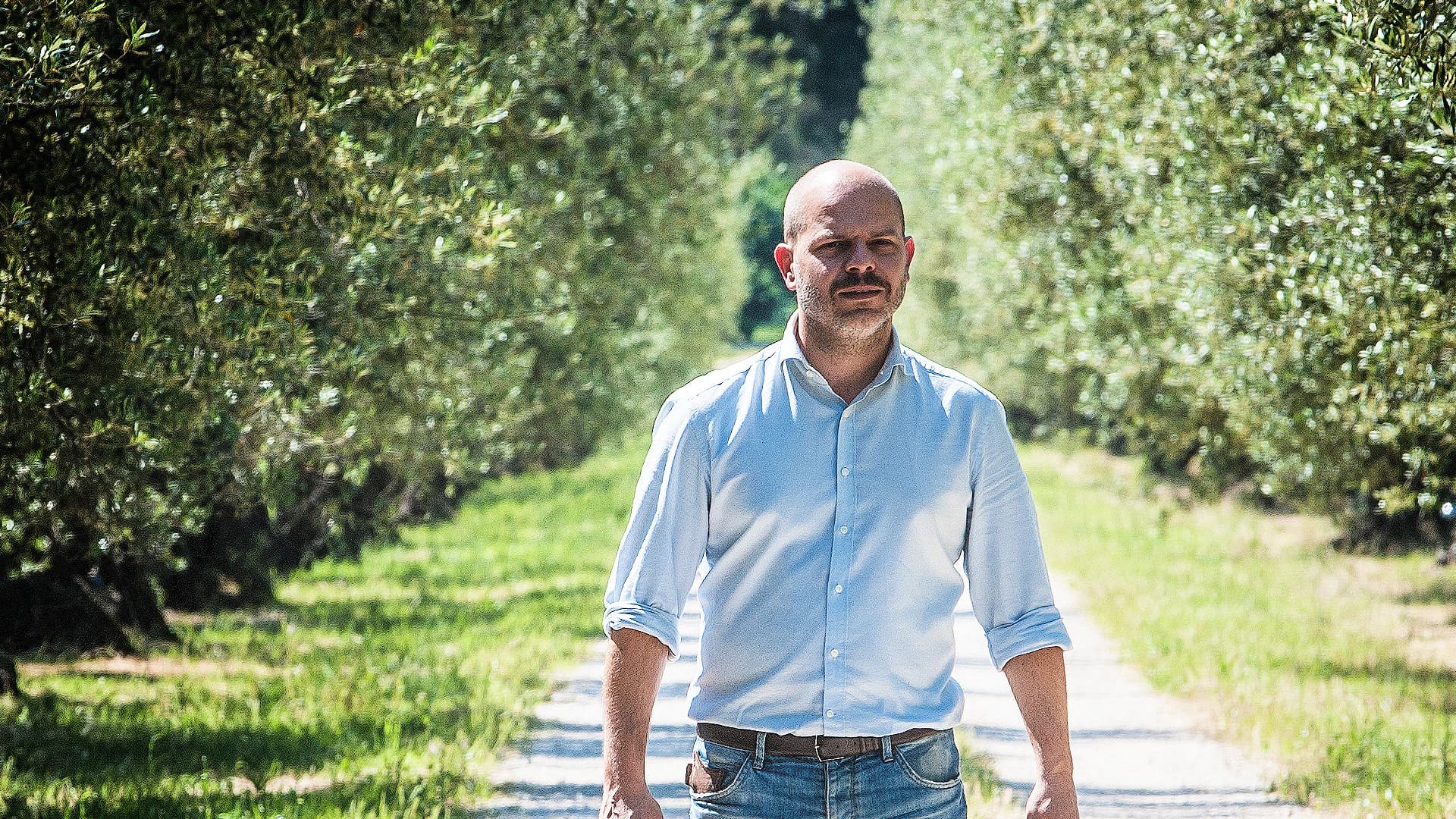
Pietro Re of Sergio Delle Monache Farm celebrated his tenth straight successful World Competition campaign (Photo: Sergio Delle Monache)
“I am glad to say that this is our tenth successful World Competition and we rank seventh among the Italian companies in the World Ranking,” Re said.
At the Sergio Delle Monache farm in Vetralla, he enhances native varieties, including Caninese, used to create the namesake award-winning monovarietal, along with Maurino, Frantoio, Bolzone and Leccino, some of which are accurately blended to create the flagship blend, Gold Organic.
Favorable weather during the warm months secured an excellent fruit development. The olives were then crushed in a latest-generation mill in the area.
“The World Competition is a global reference point and gives us producers visibility, also thanks to [its] effective communication system,” Re noted. “Indeed, we became known to our importers thanks to the Best in Class that we won at our first participation in 2014, and from that moment on, we have participated every year.”
Producers in the south had to face more challenging weather conditions, primarily due to drought, which in some cases led to lower production volumes; nonetheless, quality remained high.
Among the Apulian extra virgin olive oils recognized in the Official Guide to the World’s Best Olive Oils, three monovarietals were produced by I Pavoni in Cerignola: Pavoni Masseria Fortificata Coratina, at its seventh Gold Award in a row; Pavoni Masseria Fortificata Peranzana, at its second Gold Award; and Pavoni Masseria Fortificata Leccino, which received a Silver Award (its sixth accolade).
“We had a medium to low production in terms of quantity, but the quality was still excellent,” owner Giovanni Simeone said. “Last summer was dry, but we could irrigate the orchards and overcome this issue. Drought is certainly one of the most urgent challenges at the moment. Therefore, we recently invested in building a new well and improving our irrigation system.”
An ancient masseria lies at the heart of the estate, which encompasses 30 hectares of organic olive groves featuring 9,000 trees of various varieties, including the native Coratina, Peranzana, and Bella di Cerignola, as well as Ascolana, Nocellara and Leccino.
“After converting to organic farming, at our first participation at the NYIOOC years ago, we obtained a Gold Award. It was thanks to this competition that we found our current importer and entered the international market,” Simeone revealed, adding that today they export almost 60 percent of their production to the United States.
In Sicily, the Mandranova farm is situated a few kilometers from the southern coast of the island, in Palma di Montechiaro, in the province of Agrigento.
“This year, we participated in the World Competition with Selezione, a new blend that we have created in the mill with our Nocellara, Biancolilla, Cerasuola and Giarraffa,” co-founder Silvia di Vincenzo specified after receiving a Gold Award for this extra virgin olive oil made up of autochthonous varieties.
Promoting biodiversity and protecting the environment are core values of the family company. The Mandranova estate spans approximately 180 hectares and encompasses nearly 40 hectares of olive groves, many of which are centuries old. Younger trees have been recently added to increase production.
“We can better manage the quality of our products thanks to an irrigation system and careful monitoring of the orchards,” Di Vincenzo said. “Very high temperatures and drought are ever more frequent, making the farming operations more challenging. Nevertheless, we are structured to cope with all the variables at play. We check on the olives daily, and we carry out an early harvest. The fruit is crushed in our state-of-the-art mill, which allows us to set every detail of the production process.”
The Sicilian farmer explained how sustainable farming practices have become not only necessary to preserve the environment, but also beneficial in improving soil health.
“We let the spontaneous herbs grow, and the no-tillage technique helps us keep the soil moisture high,” she said. “We mow the crop a couple of times a year, which acts as a natural fertilization.”
Farmers from the northern regions had to contend with various weather challenges, but thanks to careful production management, the results were still outstanding.
San Massimo, located in the south of Valpolicella, near Lake Garda, is where Azienda Agricola Ca’ Crespana produces Paneolio Amethyst and Paneolio Peridot, as well as Leccino and Grignano monovarietals, both of which have received a Gold Award.
“We are really happy about these awards,” said Johannes Pan, the co-owner of the family company. “They are an important confirmation of the work we do every day with passion.”
“We always face the challenges of agriculture with enthusiasm, to constantly improve,” he added. “The bar is always raised higher, and this motivates us. These awards also serve as a significant showcase in the international market. Even if our main focus remains the regional market, we are happy to make our products known beyond the borders.”
The nearby lake creates a Mediterranean microclimate ideal for the olive trees, which enjoy the wide temperature range between day and night typical of these northern latitudes. Very calcareous and well-drained soils, shaped by glaciers millions of years ago, offer optimal conditions for olive farming.
“Last crop year was quite challenging – we had more rain than in recent years,” Pan said. “In agriculture, everything can change radically from one year to the next, and you always start from scratch.”
“Thanks to targeted agronomic measures carried out by my brother and a very disciplined harvest, we still managed to obtain excellent quality,” he concluded. “This shows how important experience, flexibility and teamwork are.”
Share this article


